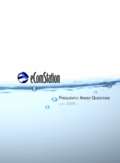Q1: What is JFS filesystem?
* Q2: Can I use Bootable JFS on SCSI disk?
* Q3: Does eComStation use JFS or JFS2?
* Q4: My PC hangs when coping files to/from JFS volume
Q5: Can I use JFS filesystem on USBMSD devices?
Q7: Can chkdsk intensify the state of damaged JFS volume?
Q9: Which value of /CACHE:x to use for JFS.IFS?
Q10: Chkdsk returns error JFS0138
Q13: Trap 3.
* Q14: How to read/write JFS volume from Windows?
* Q15: How to read/write eComStation JFS volume from Linux?
Q16: How many disk space the .LONGNAME requires?
Q17: Can I use Defragfs.exe for JFS?
Q25: Why the size of swap file on JFS can't exceed 2 Gb?
Q28: How to prevent data loss?
Q29: JFS Lazywrite parameters in CONFIG.SYS
* Q30: Chkdsk returns error JFS0148
* Q31: Does Bootable JFS work with AirBoot bootmanager?
|
|
More questions and answers
eCSFAQ brochure

|





